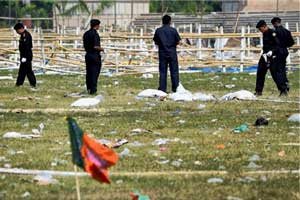 Patna, Oct 30: The Communist Party of India (Marxist-Leninist) is holding its rally here amid tight security Wednesday, barely three days after a string of explosions here left six dead and over 80 injured.
Patna, Oct 30: The Communist Party of India (Marxist-Leninist) is holding its rally here amid tight security Wednesday, barely three days after a string of explosions here left six dead and over 80 injured.
The serial blasts in Patna took place Sunday before Bharatiya Janata Party prime ministerial candidate Narendra Modi was to address a rally at the sprawling Gandhi Maidan.
Thousands of cadres and supporters of the CPI(M-L) with red flags and banners are to participate in the `kharbardar' (be warned) rally, ignoring threat perception, police officials said.
Patna District Magistrate N. Saravana Kumar shifted the CPI(M-L) rally venue to the Miller School ground and the adjoining Birchand Patel Marg from the original venue of Gandhi Maidan in view of the security concern. The police are not taking any chances.
"An elaborate security arrangement have been made for the CPI(M-L) rally in Patna following three more bombs recovered in and around Gandhi Maidan Tuesday. Police will have to be on maximum alert," Kumar told media persons here.
He said metal detectors and CCTVs have been installed at the CPI(M-L) rally venue.
Patna Senior Superintendent of Police Manu Maharaj said additional security forces have been deployed.
Kumar said that district authorities denied permission to CPI(M-L) to hold their rally at Gandhi Maidan as police and the National Security Guard were still suspecting that there could be more bombs in the ground and nearby areas.
"Gandhi Maidan would remain closed to the public for days as security forces are searching for bombs," he said.
A series of blasts took place Sunday before Modi was to address the BJP rally, leaving six dead and over 80 injured. One of the terrorists has been arrested while another is lying in a hospital in a critical condition.






Comments
Add new comment